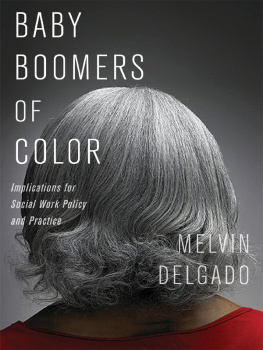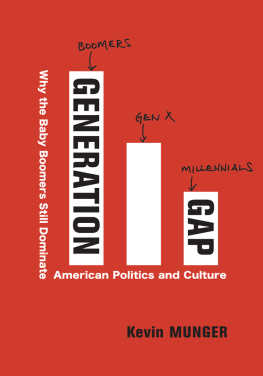BABY BOOMERS OF COLOR
Baby Boomers of Color IMPLICATIONS FOR SOCIAL WORK POLICY AND PRACTICE Melvin Delgado |
| COLUMBIA UNIVERSITY PRESS NEW YORK |
COLUMBIA UNIVERSITY PRESS
Publishers Since 1893
New York Chichester, West Sussex
cup.columbia.edu
Copyright 2015 Columbia University Press
All rights reserved
E-ISBN 978-0-231-53842-8
Library of Congress Cataloging-in-Publication Data
Delgado, Melvin.
Baby boomers of color : implications for social work policy and practice / Melvin Delgado.
pages cm
Includes bibliographical references and index.
ISBN 978-0-231-16300-2 (cloth : alk. paper) ISBN 978-0-231-16301-9 (pbk. : alk. paper) ISBN 978-0-231-53842-8 (e-book)
1. Minority older people. 2. Baby boom generation. I. Title.
HV1451.D45 2015
305.2dc23
2014014340
A Columbia University Press E-book.
CUP would be pleased to hear about your reading experience with this e-book at .
Cover design: Noah Arlow
Cover art: Christopher Robbins / Getty Images
References to Web sites (URLs) were accurate at the time of writing. Neither the author nor Columbia University Press is responsible for URLs that may have expired or changed since the manuscript was prepared.
THIS BOOK IS DEDICATED TO DENISE, LAURA, AND BARBARA
CONTENTS
MY EXPERIENCE WITH WRITING HAS taught me that no book ever evolves precisely as planned, and this one is certainly no exception. My initial intent was to focus on baby boomers of color and the cultural assets they bring to their families, communities, and the country at large. I wanted to highlight the strengths of this population, which are often ignored in the national discourse or characterized in terms of needs and issues (what I refer to as a deficits perspective). I also wanted to emphasize the potential of the social work profession to serve this population. A strengths or assets perspective is not new to social work.
Early reviewers of the book prospectus encouraged me to include the ongoing policy debates over Social Security and Medicare and how these programs would impact (and be impacted by) baby boomers of color. I was initially prepared to touch upon this, as well as concerns over the tsunami-like economic havoc baby boomers are about to wreak upon our financial and health care systems. I was not eager to devote much attention to this; I preferred to focus on my analysis of baby boomers of color from an assets or capacity enhancement perspective. However, to fully discuss the forthcoming financial and health challenges that baby boomers of color face, I had to delve into the economic literature far more than I anticipated and, quite frankly, felt comfortable with. I tried to capture the major points in sufficient detail, but not so deeply that the reader is drowned in financial analyses. I have endeavored to make this material reader friendly, but I am not sure that I have succeeded.
of the book focuses on why baby boomersparticularly those of color with low wealthpresent such challenges to our financial and health care systems and to those in the helping professions, especially social work, that are the focus of this book. These chapters have a heavy emphasis on a deficit perspective, which is quite contrary to my original intent in writing this work. Further, it is impossible to examine the current state of boomers of color without also addressing how racial discrimination has played an instrumental role in shaping the challenges they face as they enter their retirement years.
considers the economic crisis that is projected to be caused by boomer retirement and how it will bankrupt Social Security and Medicare, which has taken central stage in social policy debates about what needs to be done to avoid this nation-undermining event.
BOOK GOALS
Four goals have guided the development of this book:
(1) To provide a current and projected detailed sociodemographic picture of baby boomers of color (African American, Asians/Pacific Islanders, Latino/as, and Native Americans/Alaskan Natives) against a backdrop of baby boomers in general;
(2) to aid social workers and others in the helping professions develop an understanding and appreciation of the unique rewards and challenges that baby boomers of color provide health and social service systems now and in the future;
(3) to present social policy, research, and practice implications of baby boomers of color; and
(4) to provide an assets perspective that is uniquely tailored to the unique characteristics of boomers of color and their cultural backgrounds, with implications for the structuring and delivery of social work services to this population cohort.
These four goals are woven throughout this book in an attempt to provide a comprehensive and in-depth view of boomers, with an emphasis on those of color. To do so, the book draws upon literature and research from an interdisciplinary perspective.
BOOK OUTLINE
This book consists of three parts, eleven chapters and an epilogue. , Implications for Policy, Practice, and Research, presents a variety of ways we can address the needs of baby boomers of color that tap into social work values, particularly social justice and empowerment.
Finally, as I began researching this book, I anticipated that there would be limited research literature on baby boomers of colorbut I was not prepared for the extent of the dearth that I found. My sincere hope is that this book spurs additional research that will do justice to this crucial subject in the years to come.
I would like to acknowledge the assistance provided by Christopher Chapin, Jenee Fortier, Dory Ziperstein, Boston University School of Social Work research assistants.
THERE ARE NUMEROUS WAYS TO determine the extent to which a society is advanced: such as the longevity of its citizens and/or the quality of life and respect they are shown in older adulthood (Cook & Hatzell, 2012; Ghilarducci, 2008). While medical achievements have greatly improved the former, the latter is still highly variable. It has been argued that quality of life for baby boomers is dependent upon three factors: adequate income (Hudson, 2010), quality health care (King et al., 2013; Olson, 2013; Powel, 2013), and affordable housing (Cook & Hatsall, 2012; Gonyea, 2005; Villa, Wallace, & Huynh-Hohnbaum, 20052006). The challenges of providing each of these to the baby boomer cohort (and particularly to boomers of color) will be discussed throughout this book.
Concerns about how to serve a rapidly growing older population have been building over the past several decadeslong before the start of the recent recession (Lynch, 2010). Almost thirty years ago, Longman (1985) published an article titled Justice Between Generations: Unless a Number of Trends Are Soon Reversed, the Baby Boomers Are Headed for a Disastrous Retirement. Satcher (1996) also emphasized that the needs of older adults, particularly baby boomers of color, would require careful planning and that ignoring this cohort would be dangerous for the nations financial stability and well-being. The recession that began in 2008 has magnified concerns over the feared financial drain that wil be caused by baby boomers.
Baby boomers are entering old age at a particularly precarious political and economic time in the nations history (Hudson, 2009a; Pruchno & Smyer, 2007). There is general agreement about the seismic changes that will occur when boomers retire, and the vast majority of them are negative (Schieber, 2012; Strack, Baier, & Fahlander, 2008). Nolan (2009) predicts that boomer retirement will result in an entitlement crisis (the depletion of Social Security and Medicare), a fear echoed by many others who worry that boomers will stress our health care and Social Security systems in a way that we have never before had to contend with (Ohlemacher, 2011; Reuteman, 2010). These fears have been exacerbated by the recession, which forced many boomers to turn to Social Security earlier than anticipated because of long-term unemployment and financial crises (Johnson and Wilson, 2010a, b). The oldest of the 78 million Americans born during the post-World War II baby boom generation are turning 65 this year, while the share of the population older than 85 is growing even faster. The flood of elderly Americans is putting severe financial stress on programs that benefit older citizens (Greenblatt 2011, p. 577)












